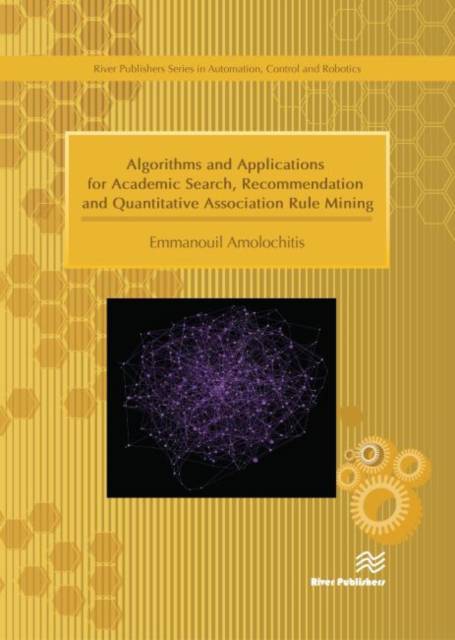
- Afhalen na 1 uur in een winkel met voorraad
- Gratis thuislevering in België vanaf € 30
- Ruim aanbod met 7 miljoen producten
- Afhalen na 1 uur in een winkel met voorraad
- Gratis thuislevering in België vanaf € 30
- Ruim aanbod met 7 miljoen producten
Algorithms and Applications for Academic Search, Recommendation and Quantitative Association Rule Mining
Emmanouil AmolochitisOmschrijving
Algorithms and Applications for Academic Search, Recommendation and Quantitative Association Rule Mining presents novel algorithms for academic search, recommendation and association rule mining that have been developed and optimized for different commercial as well as academic purpose systems. Along with the design and implementation of algorithms, a major part of the work presented in the book involves the development of new systems both for commercial as well as for academic use.
In the first part of the book the author introduces a novel hierarchical heuristic scheme for re-ranking academic publications retrieved from standard digital libraries. The scheme is based on the hierarchical combination of a custom implementation of the term frequency heuristic, a time-depreciated citation score and a graph-theoretic computed score that relates the paper's index terms with each other. In order to evaluate the performance of the introduced algorithms, a meta-search engine has been designed and developed that submits user queries to standard digital repositories of academic publications and re-ranks the top-n results using the introduced hierarchical heuristic scheme.
In the second part of the book the design of novel recommendation algorithms with application in different types of e-commerce systems are described. The newly introduced algorithms are a part of a developed Movie Recommendation system, the first such system to be commercially deployed in Greece by a major Triple Play services provider. The initial version of the system uses a novel hybrid recommender (user, item and content based) and provides daily recommendations to all active subscribers of the provider (currently more than 30,000). The recommenders that we are presenting are hybrid by nature, using an ensemble configuration of different content, user as well as item-based recommenders in order to provide more accurate recommendation results.
The final part of the book presents the design of a quantitative association rule mining algorithm. Quantitative association rules refer to a special type of association rules of the form that antecedent implies consequent consisting of a set of numerical or quantitative attributes. The introduced mining algorithm processes a specific number of user histories in order to generate a set of association rules with a minimally required support and confidence value. The generated rules show strong relationships that exist between the consequent and the antecedent of each rule, representing different items that have been consumed at specific price levels. This research book will be of appeal to researchers, graduate students, professionals, engineers and computer programmers.
Specificaties
Betrokkenen
- Auteur(s):
- Uitgeverij:
Inhoud
- Aantal bladzijden:
- 132
- Taal:
- Engels
- Reeks:
Eigenschappen
- Productcode (EAN):
- 9788793609648
- Verschijningsdatum:
- 20/02/2018
- Uitvoering:
- Hardcover
- Formaat:
- Genaaid
- Afmetingen:
- 156 mm x 234 mm
- Gewicht:
- 362 g

Alleen bij Standaard Boekhandel
Beoordelingen
We publiceren alleen reviews die voldoen aan de voorwaarden voor reviews. Bekijk onze voorwaarden voor reviews.











